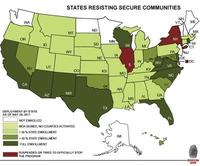-
Anthrax exposure prompts FBI investigation
Government health officials are currently investigating a case of anthrax exposure in Minnesota after tests confirmed that an individual hospitalized there had been infected with the dangerous bacteria; due to the deadly nature of anthrax and its use as a biological weapon, the FBI joined Minnesota health officials in investigating the matter
-
-
San Francisco to install real-time surveillance on buses
Thanks to a $6 million DHS grant San Francisco’s MUNI buses will soon be equipped with a network of sophisticated high-tech video cameras that will allow the transit agency to view footage in real-time
-
-
Emergency alerts for cell phones
Residents living near Austin, Texas can now receive important emergency notifications on their cell phones for free; with more and more individuals switching to cell phones and abandoning their land lines, emergency responders and government officials have been forced to adapt emergency warning systems to connect to cell phones instead
-
-
DHS set to expand Secure Communities over local objections

To help put an end to state and local authorities’ objections over the controversial Secure Communities program, the director of Immigration and Customs Enforcement announced on Friday that the agency would end its memorandum of agreements with state governors “to avoid further confusion”; the move is designed to ease DHS’s efforts to expand the immigration program across the nation, despite the increasing criticism that the program has received
-
-
Oklahoma woman battles against REAL ID
An Oklahoma woman has sparked a federal controversy after she refused to renew her driver’s license; in February Beach was pulled over by law enforcement officials in Norman, Oklahoma and ticketed for driving with an expired license and she is now fighting that ticket as part of a larger campaign against REAL ID
-
-
ASIS International awards Florida school Selects money for security
Orlando, Florida, Palmetto Elementary School is located in one of the city’s highest crime areas; the school has won a $20,000 from ASIS International for security enhancements; the money will be used for the addition of both indoor and outdoor surveillance cameras to act as both a deterrent for potential wrongdoers and to enable the school’s security team to identify those who have committed crimes on the school’s large campus
-
-
Judge orders DHS to clarify whether Secure Communities is mandatory

On Monday, a New York judge ordered federal immigration officials to provide clarification on whether or not states and local law enforcement agencies had the ability to opt out of the controversial Secure Communities immigration enforcement program; the judge’s ruling comes as part of a Freedom of Information Act lawsuit launched by several immigration and legal rights groups
-
-
Texas gets second UAV
Border agents in south Texas will be getting additional help thanks to the deployment of a second unmanned aerial vehicle (UAV) in the area; currently there are four UAVs deployed along the U.S.-Mexico border and three of them are based in Arizona; the second drone is expected to arrive later this year or in the early part of next year.
-
-
Boston threatens to withdraw from Secure Communities
On Monday Boston mayor Thomas M. Menino announced that he will withdraw the city from the controversial Secure Communities program unless changes are made; Boston was among the first cities in the United States to test the program in 2006, but now Mayor Menino is one of the many growing voices that have taken aim at the Secure Communities program
-
-
Divorce leads to approval of GPS tracking in New Jersey
A divorce case in New Jersey has resulted in the first time a state court has approved the use of GPS devices to track individuals; last week a New Jersey appellate court ruled against a man who sued his ex-wife for placing a GPS device in the car she and her husband shared
-
-
North Carolina jail investigated for immigration violations
A jail in North Carolina is currently under federal investigation on charges that local law officers mistreated detainees held as part of an immigration enforcement program; the investigation comes at the request of the state’s American Civil Liberties Union (ACLU) which requested that DHS officials investigate the Wake County jail based on fifty-seven complaints made by individuals detained there in 2009 and 2010; the complaints stem from the 287(g) program which allows local police officers to enforce federal immigration laws
-
-
Montana floods exacerbate Exxon oil spill

Flooding in Montana has exacerbated the effects of an oil spill and made clean up more difficult for Exxon Mobil; it is estimated that roughly 750 top 1,000 barrels of crude oil have leaked into the Yellowstone River near Billings, Montana; the pipeline has been shut down, but flooding in the area has made it difficult for clean-up crews to find the source of the leak
-
-
Missouri struggles to pay for natural disasters
Last week, Missouri governor Jay Nixon ordered his state budget director to put aside an additional $100 million to help the state’s disaster stricken areas recover; Governor Nixon has already ordered $50 million to be withheld, but Linda Luebbering, the state budget director, worries that the $150 million is not enough
-
-
Cook County, Illinois cancels troubled security camera program
Contrary to the latest trends, Cook County, Illinois is scrapping a project to equip police departments with real time streaming cameras; Cook County canceled Project Shield, a $44 million federally funded initiative to provide 128 local police departments with cameras in squad cars and stationary locations that streamed live video to central command centers; the program has been plagued by technical problems, cost overruns, and shoddy performance
-
-
Audit reveals Montana mishandled federal grant money
A recent audit of the Montana Department of Military Affairs found that the agency did a poor job of managing federal grant money; the investigation, led by legislative auditors, revealed that the agency had spent approximately $19 million in federal grant money over the past three years but did not monitor subcontractors;the agency is so badly organized that it could not even account for the number of active contracts that it currently had with vendors leaving the door open for potential fraud
-
More headlines
The long view
Smaller Nuclear Reactors Spark Renewed Interest in a Once-Shunned Energy Source
In the past two years, half the states have taken action to promote nuclear power, from creating nuclear task forces to integrating nuclear into long-term energy plans.
